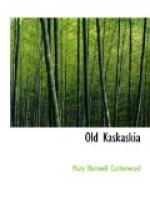“If mo’sieu’ the colonel would let me go into that room, too”—
“Go in, Achille,” said the colonel indulgently.
Colonel Menard made short work of embarking tante-gra’mere. In emergencies, he was deft and delicate with his hands. She never knew who caught her in coverlets and did her up like a papoose, with a pillow under her head.
“Pull westward to the next street,” he gave orders to his oarsmen. “We found it easy going with the current that way. It will double the distance, but give us less trouble to get into dead water the other side of the Okaw.”
Early summer dawn was breaking over that deluged world, a whiter light than moonshine giving increasing distinctness to every object. This hint of day gave rest to the tired ringers in church tower and convent belfry. The bells died away, and stillness brooded on the water plain. Hoarse roaring of the yellow current became a mere monotonous background for other sounds. A breath stole from the east, bringing the scent of rain-washed earth and foliage and sweet mints. There was no other wind; and the boat shot easily on its course alongside a thicket made by orchard treetops. Some birds, maybe proprietors of drowned nests, were already complaining over these, or toppling experimentally down on branch tips.
Kaskaskia had become a strange half-town, cut off around its middle. It affected one like a man standing on his armpits. The capital of the Territory was composed chiefly of roofs and dormer windows, of squatty wooden islands in a boundless sea. The Church of the Immaculate Conception was a laughable tent of masonry, top-heavy with its square tower. As for cultivated fields and the pastures where the cattle grazed, such vanished realities were forgotten. And what was washing over the marble tombs and slate crosses in the churchyard?
The flood strangely lifted and forced skyward the plane of life, yet lowered all life’s functions. An open and liberal sky, dappling with a promise from the east, bent over and mocked paralyzed humanity.
The noble bluffs had become a sunken ridge, water meeting the forests a little below their waists. From their coverts boats could now be seen putting out in every direction, and, though the morning star was paling, each carried a light. They were like a party of belated fireflies escaping from daylight. Faces in dormer windows waited for them. Down by the Jesuit College weak hurrahs arose from people on roofs.
“The governor has come with help for us,” said Pierre Menard.
In this dead world of Kaskaskia not a dog barked; not one of the shortened chimney-stacks smoked. Some of the houses had their casements closed in terrible silence; but out of others neighbors looked and greeted Angelique in the abashed way peculiar to people who have not got used to an amputation, and are sensitive about their new appearance in the world. Heads leaned out, also, firing jokes after the boat, and offering the colonel large shares in the common fields and entire crops for a seat in his conveyance.




